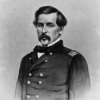Thomas Francis Meagher

Thomas Francis Meagher
Thomas Francis Meagherwas an Irish nationalist and leader of the Young Irelanders in the Rebellion of 1848. After being convicted of sedition, he was first sentenced to death, but received transportation for life to Van Diemen's Landin Australia. In 1852 he escaped and made his way to the United States, where he settled in New York City. There Meagher studied law, worked as a journalist, and traveled to present lectures on the Irish cause. He married for a second time...
NationalityIrish
ProfessionSoldier
Date of Birth3 August 1823
CountryIreland
It is not only our duty to America, but also to Ireland. We could not hope to succeed in our effort to make Ireland a Republic without the moral and material support of the liberty-loving citizens of these United States.
The glory of the old Irish nation, which in our hour will grow young and strong again. Should we fail, the country will not be worth more than it is now. The sword of famine is less sparing than the bayonet of the soldier.
I have done what I felt to be my duty.
A National Flag is the most sacred thing a nation can possess
But it so happens, and it will ever happen so, that they who have lived to serve their country - no matter how weak their efforts may have been - are sure to receive the thanks and blessings of its people.
The treason of which I stand convicted loses all its guilt, has been sanctified as a duty, and will be ennobled as a sacrifice.
The dependence of one people upon another, even for the benefits of legislation, is the deepest source of national weakness.
Judged by the law of England, I know this crime entails upon me the penalty of death; but the history of Ireland explains that crime and justifies it.
Great interests demand great safeguards.
A jury of my countrymen, it is true, have found me guilty of the crime of which I stood indicted. For this I entertain not the slightest feeling of resentment towards them.
The prosperity of a nation requires the protection of a senate. Hereafter a national senate may require the protection of a national army.
A good government may, indeed, redress the grievances of an injured people; but a strong people can alone build up a great nation.
I now bid farewell to the country of my birth - of my passions - of my death; a country whose misfortunes have invoked my sympathies - whose factions I sought to quell - whose intelligence I prompted to a lofty aim - whose freedom has been my fatal dream.